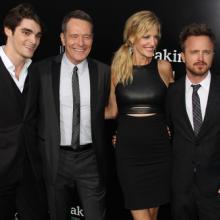AMC
“THE COMPUTER’S not the thing. It’s the thing that will get us to the thing,” intones Joe MacMillan (Lee Pace), the enigmatic visionary at the heart of AMC’s new techno-drama Halt and Catch Fire. Set in the early 1980s in Texas’ “Silicon Prairie,” the series chronicles a small, fictional software company that enters the personal computing fray. This is the age of IBM dominance and the improbability of an underdog company taking down the computer Goliath is the premise of the show.
HCF is a kind of origin myth: a drama that tries to capture the spirit and personalities that drove the personal computing revolution that reshaped the world we now inhabit. Across the cable universe, HBO offers another riff on the same theme set in the present day. Silicon Valley is a satirical send-up of startup culture and the boy-men who rule the northern California empire to which we are all in thrall. In tone and style it is the antithesis of the self-consciously serious HCF. But the two shows share a similar preoccupation with exploring the humans who make technology even more than the technology itself.
This is partially a necessity of good storytelling. Nothing slows down a story like having to explain technical expertise. At best you can get a few gags out of the science geek spewing unintelligible jargon to the bewildered “everyperson” (think Sheldon’s whole persona on The Big Bang Theory). But this narrative limitation also hints at the enigma both shows are trying to explore: Who are the people who understand the jargon and create the technology that defines our new digital age? What is the nature of this kind of power?
Wither Walter White?
How the morality tale of a cancer-stricken chemistry teacher who transforms himself (first by desperation and then through sheer hubris) into a cold-blooded, Machiavellian drug kingpin will end is what legions of fans of AMC’s Emmy-winning Breaking Bad want to know.
But after the first episode of the series’ final season aired on Aug. 11, the answer to what happens to Walter White (Bryan Cranston) remains a mystery — at least for another seven weeks.
Since its debut in January 2008, Breaking Bad has taken its audience on a spiritual journey — following Walt’s soul on a slow, steady descent into a hell of his own creation.
“Fleeting moments of possible restoration for Walter occur throughout the series,” Blake Atwood writes in the new book The Gospel According to Breaking Bad, which was released as an e-book to coincide with the season premiere.

